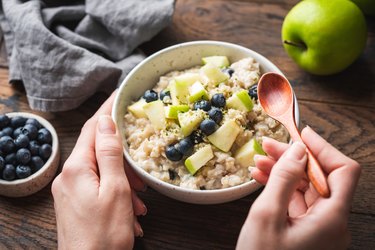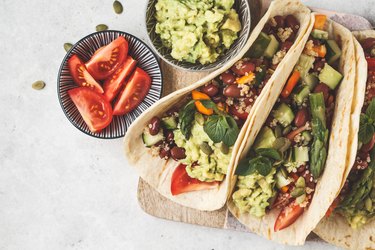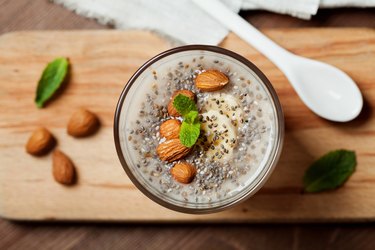
Changing how and what we eat can feel hard. Really hard. But improving the diet isn't impossible, especially when we focus on small tweaks that can bring big change.
"Starting a new habit often feels challenging because we [have] unrealistic and poorly defined expectations," says Anya Rosen, RD, IFNCP, registered dietitian, functional medicine practitioner and founder of the Birchwell Clinic.
Video of the Day
Video of the Day
What's more helpful is identifying one or two new mini-goals that feel both meaningful and approachable. "Dietary habit change needs to be realistic and achievable to prevent overwhelm and encourage adherence," Rosen says.
If you're not sure how to start upgrading your diet, begin by putting more plants on your plate.
One of the most universal gaps in the standard American diet is a notable lack of fiber. Registered dietitians agree that the single habit we could all benefit from is a greater number of plant-based foods in our diets. Here's why, plus how to make this a habit.
Why Plants Are So Important for Us
Fiber is a nondigestible carbohydrate that's present in foods that come from plants. "Plant foods include fruits, vegetables, legumes, seeds, nuts and whole grains like quinoa or oats," says Danielle Ziegelstein, RD, a registered dietitian at Nourish Family Nutrition.
While it's recommended that adults get about 25 to 35 grams of dietary fiber from whole foods daily, it's estimated that 90 percent of people assigned female at birth and 97 percent of people assigned male at birth don't actually meet these recommended daily fiber intakes, per the 2020-2025 Dietary Guidelines for Americans.
The fiber found in plant foods can improve gut health and regularity, lower cholesterol, help manage blood sugar levels, decrease our risk of certain types of cancer and reduce inflammation, Ziegelstein says. Also important: Adding more plant foods to meals often coincides with eating less animal-based and ultra-processed foods, both of which tend to be high in proinflammatory saturated fats and added sugars.
"Another added perk of plant foods is that they typically have a lower carbon footprint than their animal-based counterparts," Ziegelstein says.
Here are some specific ways plant-based foods can support our health.
1. Plants Support Gut Health
"Dietary fiber promotes bowel regularity and feeds good microbes," Rosen says. "Phytochemicals, [which are] chemical compounds produced by plants, also support beneficial bacteria and inhibit harmful pathogens in the gut."
For optimal gut health, it's important to include a wide variety of plant foods in the diet. "Think of all of the microbes in your gut as an ecosystem that thrives off of biodiversity," Rosen says. "Different bacteria require unique types of plant compounds to thrive, which is why dietary variety is essential."
Indeed, research shows that people who eat at least 30 different types of plant foods weekly have significantly more diversity in the makeup of their gut microbiome compared to those who eat fewer than 10 plant foods weekly, according to a May 2018 study in mSystems.
2. Plant Foods Are Heart-Healthy
A hallmark of the heart-healthy Mediterranean and DASH diets, plants are critical for your ticker. "Not only are plant foods rich in vitamins and minerals like potassium that can help lower blood pressure, but most plant foods are also very low in saturated fat, one of the main contributors to high cholesterol and plaque build-up in the arteries," Ziegelstein explains.
High-fiber plant foods like raspberries, oatmeal and beans also support a healthy heart by helping to lower LDL cholesterol levels in the blood, per the Mayo Clinic.
3. They Keep Blood Sugar Levels in Check
"Consuming plant foods can have a positive effect on our blood sugar levels, taking a sharp blood glucose spike and turning it into a soft hump," says Sarah Kamely, RD, a registered dietitian at Jackson Memorial Hospital in Miami. "This is because the fiber in plant foods creates a sort of mesh in our GI tract that helps slow the uptake of sugar into our bloodstream."
Getting 35 grams of dietary fiber daily is a good goal for people diagnosed with prediabetes, type 1 and type 2 diabetes, per a March 2020 review in PLOS Medicine, though almost all of us would benefit from more fiber, diabetes diagnoses or not.
Tip
“I recommend looking to vegan and vegetarian chefs and bloggers for inspiration, even if your goal isn't to be vegan or vegetarian,” Kamely says. “Chefs and recipe developers who follow plant-dominant eating patterns [are skilled at] preparing delicious, plant-rich dishes.”
How to Start Eating More Plant Foods
It may take anywhere from 18 to 254 days to successfully establish a new habit, per a July 2009 study in the European Journal of Social Psychology. That's a hefty range, but beginning a new habit doesn't have to feel like a heavy lift.
"To set ourselves up for success, it can be helpful to break down an overarching goal like 'eat better' into micro-goals, such as, 'add a half-cup of vegetables to one meal every day this week,'" Kamely says.
"Set one or two achievable goals each week and, over time, you'll not only build on your micro-goals but also gain confidence in your ability to make [positive] change."
Remember: Fruits and vegetables aren't the only plant foods around. Upping your intake of nuts, seeds, legumes and whole grains will also put more plants into your rotation. Below, dietitians share smart ways to add more plant foods to your diet:
- Add veggie noodles like spiralized zucchini to your usual spaghetti bowl or try out a legume-based noodle such as chickpea pasta or edamame noodles.
- "Sweet breakfasts, like oatmeal or yogurt, are great opportunities to add berries," Rosen says.
- "Seeded crackers are your friends," says Kamely. "They're a shelf-stable and satisfying crunchy snack that can be used as a vessel for nut butter or hard-boiled eggs or simply crushed up as a salad topping."
- Swap traditional butter for smashed avocado or a nut- or seed-based butter like peanut butter or sunflower seed butter on top of toast for more heart-healthy fats and plant-based protein.
- Add a few handfuls of leafy greens like baby spinach or frozen cauliflower rice to homemade smoothies.
- Add spices and fresh herbs to everything. "Herbs and spices have numerous health benefits and pack a ton of flavor too," Kamely says. Throw fresh parsley or mint into salads and grain bowls.
- "Avocado is a perfect substitute for mayo in chicken or tuna salads," Rosen says.
- Top salads and grain bowls with crunchy ingredients like sunflower or pumpkin seeds that provide micronutrients and texture.
- Swap packaged cereal bars for homemade trail mix made from nuts, seeds and unsweetened dried fruit at snacktime.
- Throw zucchini or riced cauliflower into homemade meatballs or beef patties for a fiber boost you'll barely notice.
- Add frozen vegetables to stir-fries, pastas and omelets, Ziegelstein recommends.
- Replace white bread with whole-wheat bread or even a quarter-inch slab of baked sweet potato "toast."
- "Swap meat for a plant-based protein by making a lentil-based bolognese sauce," Ziegelstein says. Or, use half your usual amount of beef and lentils for the other half.
Tip
Another helpful way to integrate a new habit is to attach it to an existing one, an approach called "habit stacking."
Let’s say you cook eggs for breakfast most days of the week. A simple way to increase the number of plant foods in your diet would be to add a few handfuls of spinach to your scramble every time, Rosen says. Stacking this new habit (eating more plant foods) on top of an existing habit (cooking eggs for breakfast) can make it feel less intimidating or unknown.
The Bottom Line
When working more plant foods into your diet, "count colors, not calories," Ziegelstein says.
"All of the different [pigments in produce] contain different nutrients. Carrots and sweet potatoes are rich sources of vitamin A, while spinach and Brussels sprouts have high amounts of folate, iron and vitamin K. Blueberries and cabbage are great sources of anthocyanins, a plant compound that has antioxidant and anti-inflammatory properties."
And perhaps just as important: "Variety prevents boredom and keeps meals exciting and enjoyable — not to mention, delicious," Ziegelstein says.
- USDA: "2020-2025 Dietary Guidelines for Americans"
- mSystems: "American Gut: an Open Platform for Citizen Science Microbiome Research"
- Mayo Clinic: "Cholesterol: Top Foods to Improve Your Numbers"
- PLoS Medicine: "Dietary Fibre and Whole Grains in Diabetes Management: Systematic Review and Meta-Analyses"
- European Journal of Social Psychology: "How are Habits Formed: Modelling Habit Formation in the Real World"


